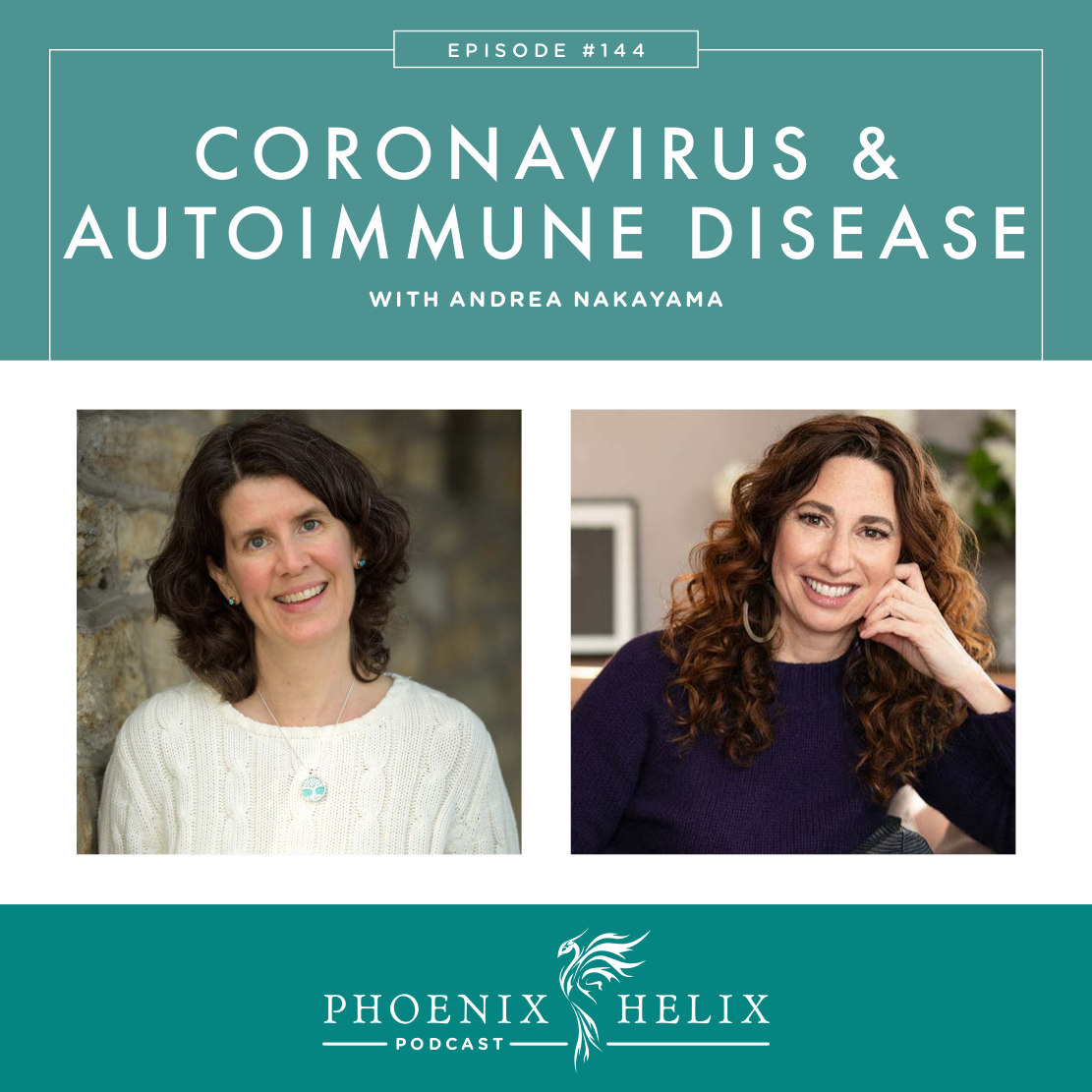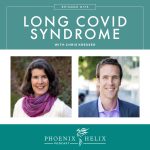Note to Listeners
This podcast was recorded early in the pandemic in March 2020. While the advice on diet, lifestyle, and mindset still applies, scientifically we didn’t have full knowledge of the pandemic. For more up-to-date information, listen to the following episodes: In Episode 154, we discuss what increases and decreases risk for a severe COVID-19 infection outcome for people with autoimmune disease. In Episode 175, we talk about Long COVID Syndrome. And in Episode 187, we answer questions about COVID-19 vaccines for people with autoimmune disease.
Listen to the Show
- Subscribe to my podcast through your favorite podcast app: iTunes, Stitcher, Google, TuneIn, Spotify, Amazon, etc.
- You can also listen to the episode right here through the player below, and if you subscribe to my newsletter you’ll get notified of future episodes.
Podcast: Play in new window | Download
Show Notes
- Intro (0:00)
- Meet Andrea Nakayama
- She is a world-renowned functional nutritionist, educator, and speaker, whose mission is to change the way we do healthcare by empowering patients to reclaim ownership over their own health. She’s trained thousands of practitioners through her Functional Nutrition program. She’s also a fellow autoimmune warrior and one of my favorite podcast guests.
- Prior podcast interviews with Andrea:
- Thank You to Our Podcast Sponsor: Paleo on the Go (2:48)
- A frozen meal delivery service, 100% of their menu is compliant with the elimination phase of the paleo autoimmune protocol (AIP). They have over 6o items, including entrees, side dishes, broth, AIP-friendly bacon, and desserts.
- Use the code PHOENIX for 10% off your first order.
- Take a Deep Breath (3:59)
- Whenever your fear gets triggered, pause for a few seconds and take a deep breath. This helps us tap the relaxation response, interrupting that fear cycle.
- Carefully Choose Your News (4:25)
- With the 24/7 competitive news cycle, headlines often become fear-based to try to get viewers and readers. Carefully choose where you get your information.
- Eileen recommends the CDC within the United States, the WHO for international coverage, and one trusted local news source to keep you up-to-date on what’s happening in your community.
- Also limit your news time. It can become almost addictive, checking for updates throughout the day and night. But this drives up anxiety, and we can’t sustain it long-term. Once-a-day is enough to keep you informed, and it’s also okay to take a few days off from the news altogether.
- Circle of Concern vs. Circle of Influence (7:12)
- This is a framework created by Stephen Covey, to teach proactivity rather than reactivity. Fears live in our circle of concern. Personal action takes place in our circle of influence. Andrea’s goal today is to help us expand our circle of influence regarding the coronavirus.
- What Is the Coronavirus? (7:56)
- Coronavirus is actually a family of viruses. COVID-19 is the infectious disease caused by a new variation of the coronavirus, which has now spread around the world.
- Coronavirus acts like a parasite, entering our body through mucus membranes, then taking over cells to replicate itself. Normally our immune system fights it off, but if unsuccessful, COVID-19 can lead to acute respiratory infection, and death in a small percentage of cases.
- Resource: Illustration of how coronavirus behaves in the body.
- How Does It Differ from the Flu? (11:46)
- Coronavirus attacks the lower respiratory system and its symptoms can feel similar to pneumonia. The flu attacks the upper respiratory system.
- The rate of mortality for COVID-19 is still unknown, but the WHO estimates it being between 3-4%, compared to 0.1% for the flu. It’s also more contagious than the flu (about twice as contagious).
- The flu does have a season where its rates go down. The coronavirus is too new to know how it will behave.
- As we share these statistics, remember that the vast majority of people recover from both the flu and coronavirus.
- Resource: How does the new coronavirus compare to the flu?
- What Are the Symptoms of COVID-19 (15:37)
- Low fever
- Dry cough
- Fatigue
- Difficulty breathing
- Pain or pressure on the chest
- When severe, it can progress to acute respiratory distress and sepsis.
- If you’re experiencing mild symptoms, call your doctor. Many offices now offer telemedicine (consultations over the phone to prevent the spread of the virus). They’ll determine if you fit the profile for testing and tell you where the nearest testing facility is.
- However, if you are experiencing severe symptoms, go directly to the emergency room. (Don’t go to the ER for mild symptoms – we want to leave acute care services for the people who need it most.)
- Why Containment Is Important (20:13)
- When we hear about travel bans and school closures and home quarantines, it can sound very scary. But these are important measures that are actually helping us. They’re necessary to stop the spread of this virus.
- The countries that enacted containment measures soonest had the least number of COVID-19 cases (Singapore is an excellent example). The countries that acted more slowly have skyrocketing numbers. The containment measures are for our benefit. They’re disruptive and there will be an economic impact, but they’re not permanent.
- How Does Autoimmune Disease Impact the Risk of Infection? (22:14)
- We are immune-compromised, but that doesn’t mean our immune systems are incapable of fighting a virus.
- Vulnerability will vary between individuals. Some people’s immune systems are overactive – they rarely get sick. If you’re in that category, autoimmunity might actual provide you with a little extra protection. Other people get sick more frequently, so they know they need to be extra cautious at this time. If you are on immunosuppressant medication, you need to be extra cautious as well.
- That said, Andrea recommends everyone with autoimmune disease take extra care to support their immune system at this time. (Specific advice coming up later in the interview.)
- Update August 2020: We discuss this in detail in Episode 154.
- Cleaning Hands & Surfaces (28:08)
- The virus can live on surfaces for days and transfer to our hands. Then, when we touch our face (which we all do multiple times per hour unconsciously), we can become infected.
- Soap & water kill the virus. It can be hot or cold water, but you need to wash your hands for 20 seconds. (Sing the “Happy Birthday” song twice.)
- When you go out in public, try to limit how many surfaces you touch. You can use tissues to open doors, for example. When you come back home, wash your hands immediately and then disinfect things you touched while you were out (car steering wheel, gearshift, doors, and accessories; doorknobs, cellphone, etc.)
- Andrea’s homemade disinfect is 60% rubbing alcohol, 40% aloe vera, and some essential oils.
- If you’re experiencing symptoms, cough and sneeze into your elbow, not your hands. Wash your clothes more frequently. Switch to single-use towels and napkins around the house. Andrea has mild cold symptoms, so she is using washable rags in place of towels and napkins right now, and throwing them into the laundry basket after one use.
- This requires a mindshift. It’s far more cleaning than most of us are used to.
- Travel Precautions (37:00)
- Cancel all optional travel. Although travel companies are doing their best to practice extra sanitation measures, contagion opportunities are much higher when traveling. That includes planes, buses, trains, and cruise ships.
- While driving by car is safer, there are additional exposure opportunities on the road and at your destination.
- Both Andrea and I canceled our recent travel plans.
- Get Creative in the Time of Social Distancing (39:31)
- Get outside. Social distancing isn’t house arrest. Take a walk if you can. Read on your porch. Do some gardening. It’s good for both the mind and body to get out the house into the fresh air.
- Maintain social connections virtually. Do video dates if you have to cancel in-person ones.
- Also, many artists have had to cancel tours: authors, musicians, dance companies, etc. Many are planning virtual events. Some are free and others are donation-based to support them during this time. Look for those events and attend from home.
- The Downside of Overpreparedness (42:08)
- COVID-19 is an event that’s impacting every community in the world, and the only way through is together. When people panic, they tend to hoard resources. That’s why there’s a mask and glove shortage right now, and why there have been runs on the grocery store.
- Regarding food, Andrea and I both have some food in our freezer and pantry, but we are still grocery shopping normally, rather than buying in bulk. We know our entire community needs to share the food, and we trust the stores will be re-stocked as needed.
- Neither one of us is buying gloves, because they can be more problematic than helpful. They give people a false sense of safety, because they can carry the virus just like hands do. Washing your hands is the best protection.
- Thank You to Our Podcast Sponsor: Autoimmune Strong (45:46)
- Healthy movement is beneficial to both physical and mental health. It reduces anxiety and depression, improves sleep, and also helps maintain a healthy immune system. But what if your inflammation is so high that exercise seems to hurt instead of help? This program is for you! It’s specifically designed for people with exercise intolerance, to help you slowly and safely exercise in a way that builds strength without increasing inflammation.
- Autoimmune Strong is the only online exercise program designed for people with autoimmune disease, by a personal trainer who has autoimmune disease herself.
- Membership gives you access to videos that are designed for all body types – even people with severe joint pain or limitations getting up and down off the floor. The videos are short and easy to follow. They slowly progress in intensity and teach you how to find the level of exercise that’s safe for you. The program focuses on strength, flexibility, and cardio fitness.
- In addition to the videos, membership gives you access to a supportive online community and a monthly Q&A call with founder and personal trainer, Andrea Wool. In this time of social distancing, this is a wonderful resource for maintaining social connections and support.
- Listen to my interview with Andrea to learn all about exercise intolerance and why it’s a common side effect of autoimmune disease.
- Join Autoimmune Strong and use the code PHOENIX for 10% off your first month.
- Food, Supplements, and Lifestyle Measures that Support Immune Health (47:33)
- Always focus on food first. It’s the safest way to get the nutrients we need without accidentally over-supplementing.
- Since most of the immune system lives in our gut, supporting gut health is the best way to support immune health bodywide. Some of Andrea’s favorite foods for gut health are fermented foods, broth, garlic, ginger, citrus, and turmeric.
- Also focus on eating the rainbow, because each color provides different phytonutrients that support health overall.
- Andrea’s recommended vitamins and minerals that support immune health, and top food sources for each one: Vitamin D (oysters, sardines, and shrimp). Vitamin A (liver, and if you struggle with the idea of eating organ meats, they do sell dehydrated liver supplements). Vitamin C (kale, broccoli, cauliflower, and Brussels sprouts). Quercetin (onions). Zinc (crab and oyster). The Nutrient Dense Kitchen is a paleo AIP cookbook that focuses on getting key nutrients through food. In addition to recipes, there are tables at the front of the book listing the best food sources for each nutrient.
- When it comes to herbs and botanicals that boost the immune system, people with autoimmune disease have to be careful that they don’t stimulate an autoimmune flare. It will take some trial and error to find the ones that work well for your unique immune system. Andrea loves oregano oil. Eileen loves olive leaf. Some other options you can try are: mono-laurin, curcumin, elderberry, propolis, echinacea, astragalus, and medicinal mushrooms. (Don’t try them all at once. You don’t want to overload your body. Consider it a self-experiment and choose one at a time until you find one that works for you).
- You can incorporate some of those botanicals as foods, with no risk of overstimulating the immune system. (Supplements are far more concentrated.) Incorporate fresh oregano and other herbs into your meals. Coconut oil is a source of mono-laurin, and raw honeycomb is a source of propolis. And a gentle way to use oregano oil without taking it internally is to apply some to the soles of your feet.
- Sleep and stress management are also extremely important to immune health, and there’s no risk that sleep will overstimulate your immune system.
- And don’t forget hydration. Drink plenty of water every day.
- How Do Fear & Anxiety Impact Our Immune System? (1:000:20)
- Fear & anxiety are part of the human experience. Don’t judge yourself for having these feelings, especially during this pandemic. The goal isn’t to eliminate all feelings of anxiety, because that’s not possible. However, when we live in a state of chronic fear and anxiety it does have consequences.
- Fear & anxiety increase cortisol (the stress hormone). They use up neurochemicals that normally support our immune system. They exacerbate pain and can cause gastro-intestinal issues. They’re a drain on our health, instead of a support. They’re also disempowering, because we focus on what’s out of our control, instead of the things within our circle of influence.
- Resource: Ep. 146: Anxiety & Autoimmune Disease.
- Tips for Managing Stress & Anxiety (1:02:31)
- We all need a stress management toolbox. Make a list for yourself, and print it off for easy reference. When we’re anxious, our brain can freeze, and we can forgot all the stress-relieving tools available.
- Andrea’s favorite techniques:
- Research – gaining knowledge and understanding reduces her fear.
- Exercise – yoga and walking.
- Getting out in nature.
- Sleep – she has a regular bedtime that’s non-negotiable.
- Laughter.
- Watching shows where people are living their passion, like The Voice.
- Spending time with people she loves.
- Meditation.
- Relaxing essential oils, like lavender.
- EFT/Tapping.
- This blend of techniques is her cradle of resilience.
- Eileen’s favorite techniques:
- Many of the same ones Andrea mentioned above. Additional ones that help me are:
- Deep breathing.
- Journal writing. Putting it on paper helps me let go.
- Time offline (no TV, no internet, no social media).
- Streaming TV rather than live TV (so I’m not subjected to constant news breaks).
- Epsom salt baths before bed.
- Helping others.
- Resources:
- Outro (1:09:56)
- Andrea trains practitioners through The Functional Nutrition Lab. She offers patient counseling services through the Functional Nutrition Alliance. She has a podcast for practitioners called the 15 Minute Matrix. We recently recorded a special episode on inflammation, where I was the guest host, and she was the featured speaker. You can also listen to my prior interview with Andrea here on the Phoenix Helix podcast: episodes 27, 70, and 119.
- Eileen (your podcast host) is the author of multiple books, written to help people thrive with autoimmune disease. Learn more on the Books Page.
- If you like this podcast, follow or subscribe through your favorite podcast app. You can also subscribe to Eileen’s biweekly newsletter.
- Check out the entire archive of podcast episodes.
You May Also Be Interested In
Spreading the Word
If you like the podcast, please leave a positive review in iTunes. It would mean the world to me, and also helps others find the podcast. Here are some quick instructions using your iPhone:
- If you are already subscribed to my podcast: (1) Click the purple podcast icon. (2) At the bottom of the screen, click Library. (3) At the top of the screen, click Shows. (4) Click the Phoenix Helix podcast image. (5) Scroll down the page, and you’ll see Ratings and Reviews. Scroll down a little bit more and click on Write a Review. This will bring up the review screen. Tap 5 stars (if you love the podcast), and then click in the title box, and it will bring up the keyboard. Enter a title and short review. (6) Click Send in the upper right corner. (7) Thank you! Positive reviews give the podcast a higher search ranking in iTunes, helping people find it and letting them know it’s a quality podcast and worth their time to listen.
- If you haven’t subscribed to my podcast: (1) Click the purple podcast icon. (2) In the lower right corner, click the magnifying class. (3) Type Phoenix Helix in the search box. (4) Click the podcast cover in the Show list. (5) If you’d like to subscribe, click the + sign at the top of the screen. (6) To write a review, scroll down the page, and you’ll see Ratings and Reviews. Scroll down a little bit more and click on Write a Review. This will bring up the review screen. Tap 5 stars (if you love the podcast), and then click in the title box, and it will bring up the keyboard. Enter a title and short review. (7) Click Send in the upper right corner. (8) Thank you! Positive reviews give the podcast a higher search ranking in iTunes, helping people find it and letting them know it’s a quality podcast and worth their time to listen.








